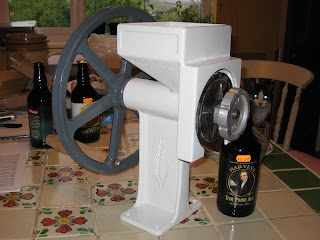I'm suprised at how many estate agents there are here - every small town boasts at least two, and they each have at least a hundred places for sale on them. Seems that the whole of the department is up for sale! However, it's not such a good thing, for us anyhow.
Most of the places for sale are of two sorts: new build Lego box houses with small gardens comprised of builder's rubble, or what Time Team would imaginatively describe as a "post iron age farming settlement", an agent would describe as "maison a renover, beaucoup de charme", but which appears to the author to be a series of broken walls with brambles poking out of the roof for fifty quid.
To find a small house with about 2 hectares of land is hard due to the law here which says that land for sale must be offered to the local farmers first before anyone else can buy it. This has good and bad points. It's good that good land is offered to someone local who can produce food from it, and this keeps land out of the hands of prospectors and developers. However, this has meant that farms here get bigger and bigger, land is lost to small producers, variety in the landscape is lost (every other field here is maize), and you end up with large farm buildings cut off from the land they need, and therefore they just stand empty and falling down because no-one can use them.
Also, things ain't as cheap as they were. 5 years ago the British were over here in droves snapping up cheap places and renovating them. The Bretons (not French - bit like calling Welsh English) have cottoned on to this a bit and are asking for more. Also, the Brits are selling up due to various things (liver damage and divorce seem to be the most common reasons!), having spent small fortunes renovating -often badly- their homes and wanting some return on their labours. This means you can not get charming old farmhouses with a bit of land for under E200k these days, unless they're completely knackered, and have had the original occupants die of old age inside. Still, hope oft endures.
Also, I'm nowhere near an expert, but even I can see that repairing and rendering cob walls with concrete spells disaster! Around here is mainly cob, which is left unrendered traditionally, and patched as and when needed - but not nowadays. Brittany is famous for being wet, so you have lots of buildings that would be listed in the UK looking like sandcastles with the tide coming in around them. The method as far as I can tell is to patch holes with concrete blocks, put plastic double glazing in, and cover the lot with concrete rendering. Recipe for disaster there, like. Concrete is impermeable to water, so any wet inside the wall can't get out, and instead will turn the wall to mud. Voila - a mud wallow for the pigs where your house should be!
I guess the reaosn is that there are so many places here like this that it's not seen as important to conserve them. The Bretons seem to prefer something modern (i.e. clean, dry and warm!) and are not interested in these old places - maybe because they've grown up with them. In the UK most people are from urban enviroments with bad, boring architecture and want to preserve anything seen as unusual, or of quality, or with some history attached. Hence the National Trust, etc. Their towns are well-preserved on the whole though, and clean as a whistle. No litter, no billboards, hardly any traffic, the old buildings are still used, and not looking like they've been pickled and put on a museum shelf like ours have, and this is the most important thing: buildings are for people, not the other way around.
Off to the Armorica National Park today to see an organic farm, a country house + gite and 2 acres, and a wind-blasted corps de ferme (farm complex) up on t'moors. The first two might break the bank, the latter the spirit. We'll see...



 Here's my idea based on a 7000m2 field plus a bit of garden:
Here's my idea based on a 7000m2 field plus a bit of garden: The red line is the property boundary - this is the plan of "house no.1" as per previous blog entry. We've put an offer in because it's the best one we've seen, and also the first!
The red line is the property boundary - this is the plan of "house no.1" as per previous blog entry. We've put an offer in because it's the best one we've seen, and also the first! Saw this on Wednesday. All lime render and posh tiles, but NEAR A ROAD!
Saw this on Wednesday. All lime render and posh tiles, but NEAR A ROAD! Light at the end of the tunnel?
Light at the end of the tunnel?



 Day off walking along the Blavet.
Day off walking along the Blavet.
 Place no.2: an organic farm with 2 hectares, polytunnels and a tractor:
Place no.2: an organic farm with 2 hectares, polytunnels and a tractor: Place no.3: an old set of cottages with outbuildings, on 2.3 hectares (a hobbit is opening the door):
Place no.3: an old set of cottages with outbuildings, on 2.3 hectares (a hobbit is opening the door):
 The secret garden.
The secret garden.  View from house no.1 to front gate and spring-fed pool through trees.
View from house no.1 to front gate and spring-fed pool through trees. House no.1 - a 70s interior decorator's wildest dream inside!
House no.1 - a 70s interior decorator's wildest dream inside! View from the houses to the third barn.
View from the houses to the third barn. You need a beer after using this monster!
You need a beer after using this monster!






